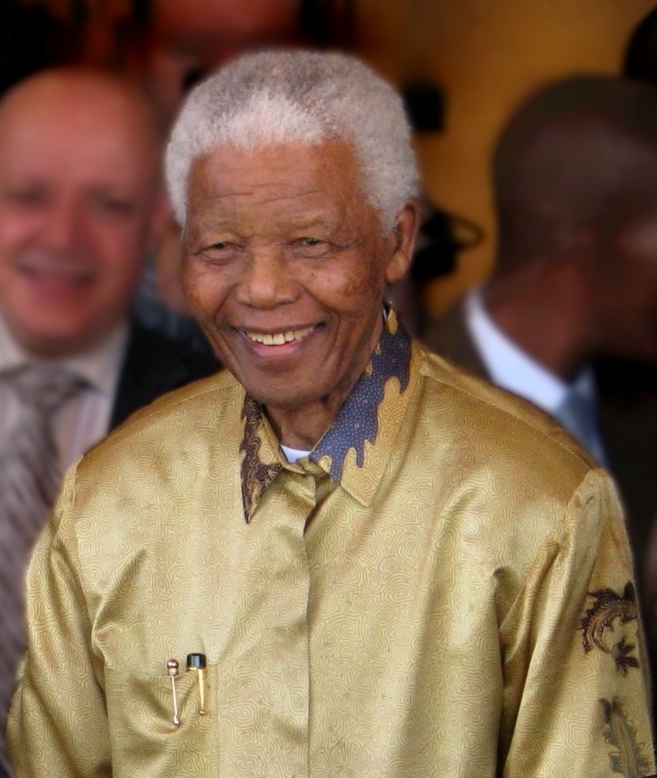This week has been an uplifting one for social and political activists and media hounds. The death of Nelson Mandela has brought together world leaders, pundits, politicians, and us common folk to celebrate the passage of a transformational leader.
I imagine that no one ever expected to see a Castro and a Bush standing together, yet the respect that people hold around the world for the life and works of Nelson Mandela brought them into the same room (or in this case, arena).
The power that is demonstrated in the aftermath of Mandela’s life — the celebration, the near universal belief in his goodness — is testament to the effect that a leader can have in engaging and motivating his or her people to do their own great things.
This week has also been a rewarding one for those in the ChangeEngine community. There has been great response to the weeklong campaign to discover what will “save” Baltimore, whether it needs to be saved, what that saving will look like to us, our neighbors, and the world, and how we as Baltimoreans might go about doing some saving ourselves.
My column here deals with issues related to public health on a macro scale with a micro focus, and so I meander from vaccination to food, from food to transport, to poverty, to pollution, to economics, and now to leadership.
One of my most psychologically taxing classes in public health school was centered around leadership. The professor brought in health care leaders and drilled us on the proper layout of a corporate leadership structure, including the role of board members and executives. I can speak from the authority of at least the upper left hand quadrant of the room that ‘bored’ members were what he had in front of him, and that the lesson was not sinking in. However, he was there to teach it, and so I was convinced that there was a reason.
Each of us has experienced a piece, a whiff of transformational leadership, perhaps on the job, in the classroom, on the playing field: A leader who transcends the role they are inhabiting and creates in each member of the team a desire to excel, as if some grand musical score is accompanying your every movement. This may happen for only a moment, or it may infuse your entire work experience (lucky you!), but the feelings and actions brought to the surface by this type of leadership allow us to be better than we are alone.
It is better to lead from behind and to put others in front, especially when you celebrate victory when nice things occur. You take the front line when there is danger. Then people will appreciate your leadership.
How does this tie into public health, and more importantly this week, into saving Baltimore?
My sense is that Baltimore is a city that is reaching for success. The city government, neighborhood associations, the ChangeEngine bloggers, the urban gardeners, the foundations, the artists — everyone has a vision for a better Baltimore, and they each view it through their lens. Chris Merriam of Bikemore commented on the ChangeEngine Facebook page yesterday that what will save Baltimore is “Bike lanes. Lots and lots of bikelanes.” OK, so I agree with him, of course. See here, here, here, and here, oh, and here for evidence. But he (and I) are speaking from a cyclocentric point of view (although we would likely both agree that this has broad implications for health, wealth and society far beyond bikers). The Weinbergs, Stephanie Rollings Blake, Hasdai Westbrook (of ChangeEngine fame), and you all have different visions of a successful Baltimore.
Now despite the wealth inequalities, segregation, and disease burden here that I often write about, Baltimore is not South Africa. However, leadership that is empowering, vision-driven, and inclusive has the power to be transformative anywhere in the world, in any setting. I am not advocating for the ouster of the mayor; I think she’s probably doing fine. But is she a transformative leader? She has taken on a number of challenging projects that have great promise — more families in the city, a clean harbor, lower vacancy rates — but these efforts have not inspired a groundswell of concerted support and action. Perhaps that is not the role in this city for a transformational leader. “Bureaucrat” may sound like a dirty word, but bureaucracy is effective, reliable, and honest (when done correctly at least, Ms. Sheila Dixon, we’re looking at you…).
Perhaps instead the role needs to be taken up by others in that list I mentioned above, as Chris Merriam is doing in the biking community. His sheer force of will and passion drive others to work toward his cause, and to feel good about it.
Nominate a transformational leader, Baltimore (or wherever you are):
Who do you see bringing people together, challenging them to do their best and more by example? Who is using vision-driven empowerment to allow their colleagues to do more, do better, or with more grace? Who among your social or professional circles takes on that role? How can you emulate those techniques to generate even MORE positive growth in your particular arena?
Are you a champion of transformational change by leadership and example? If not you, who?



